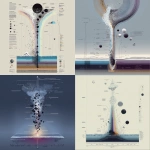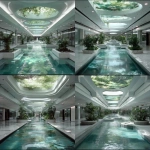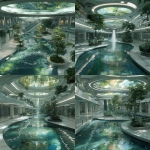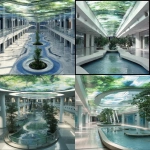Explore the Best AI Image Gallery

Quantum Leaps: Reshaping Creativity with Quantum Computing
The realm of creativity is on the cusp of a radical transformation, driven by the exponential power of quantum computing. This revolutionary technology, operating on the principles of superposition and entanglement, promises to unlock unprecedented possibilities for artists, designers, and innovators across various disciplines.
Quantum Creativity: Unlocking New Dimensions
Imagine crafting intricate 3D models with unparalleled precision, generating immersive soundscapes that transcend human perception, or designing interactive narratives that adapt in real-time based on audience engagement. These are just glimpses into the potential of quantum computing to revolutionize creative workflows.
Potential Applications: A Glimpse into the Future
- Design and Architecture: Quantum algorithms can optimize structural designs, simulate complex materials, and generate innovative architectural concepts with unprecedented speed and accuracy.
- Music Composition: Imagine AI-powered tools that leverage quantum computing to compose intricate melodies, harmonies, and rhythms, pushing the boundaries of musical expression.
- Filmmaking and Animation: Quantum simulations can enhance visual effects, create realistic character movements, and generate dynamic environments, elevating storytelling to new heights.
- Interactive Art: Quantum computing can enable interactive installations that respond to viewer emotions, movements, or even thoughts, creating truly immersive and personalized artistic experiences.
Ethical Considerations: Navigating the Uncharted Waters
As with any powerful technology, quantum computing raises important ethical considerations. It is crucial to ensure responsible development and deployment, addressing concerns such as:
- Bias and Fairness: Quantum algorithms trained on biased data can perpetuate existing inequalities. It is essential to develop methods for identifying and mitigating bias in quantum models.
- Intellectual Property: The ability of quantum computers to generate creative content raises questions about ownership and copyright. Legal frameworks need to adapt to the unique challenges posed by AI-generated art.
- Accessibility and Equity: Quantum computing resources can be expensive, potentially creating a divide between those who can afford to leverage its power and those who cannot. It is important to promote equitable access to quantum technology.
Future Trends: Shaping the Quantum Creative Landscape
The future of quantum computing in the creative industry is brimming with possibilities:
- Hybrid Creativity: We will see increasing collaboration between human creators and quantum algorithms, leveraging the strengths of both to achieve groundbreaking results.
- Quantum-Enhanced Sensors: New sensors powered by quantum principles will enable artists to capture and interact with the world in entirely new ways, sensing light, sound, and even emotions with unprecedented sensitivity.
- Personalized Creative Experiences: Quantum computing can tailor artistic experiences to individual preferences, creating immersive environments that adapt and evolve based on viewer engagement.
As quantum technology continues to advance, it promises to reshape the creative landscape, empowering artists and innovators to push the boundaries of imagination and explore uncharted territories. The fusion of art and science is poised to usher in a new era of creativity, where the impossible becomes possible.








](https://images.ai-img.art/thumbnails/150/230fb1adf4241373591167585daecc4556f4c58c4d0dc33638c62b1c60c1b72a.webp)
](https://images.ai-img.art/thumbnails/150/10ab1dbb1358d3dbba41472a395400bd9daf5cba3f5c8841970b4110820d5a15.webp)




](https://images.ai-img.art/thumbnails/150/b814eba984b490e7f87095501b4c13b17e89f8960f044f09fbf2053969d9be29.webp)










](https://images.ai-img.art/thumbnails/150/2f4f685af05f9526e1ac2f05f53dbb1d97bf8a65f6a41c6e67059c5ed2aa871f.webp)

](https://images.ai-img.art/thumbnails/150/58fa7e3c741db40e9e61e20410c8d5675b11efb625df109812cc768f9b17b717.webp)
](https://images.ai-img.art/thumbnails/150/bda14621f89269b376d6681934fea3c4af8c5f8593b80e1cb25cdf0047f98621.webp)






](https://images.ai-img.art/thumbnails/150/266c825c7f03beff90a8a60e36207b8240cdf722eb1cf5db26e8adb51b992287.webp)
](https://images.ai-img.art/thumbnails/150/f7e46d83151e744219d4886ca1329794d3e9d5071649abea0b2996cb34c3c77c.webp)





](https://images.ai-img.art/thumbnails/150/6650b0d98c6fec81df8bdfb569e0033970b46a653d188dde42417e624901493f.webp)

](https://images.ai-img.art/thumbnails/150/396b1c442fa4d576e35f871ba0f3c7e52bb62c6bcee69082dbcb816a5fd3aa8c.webp)




